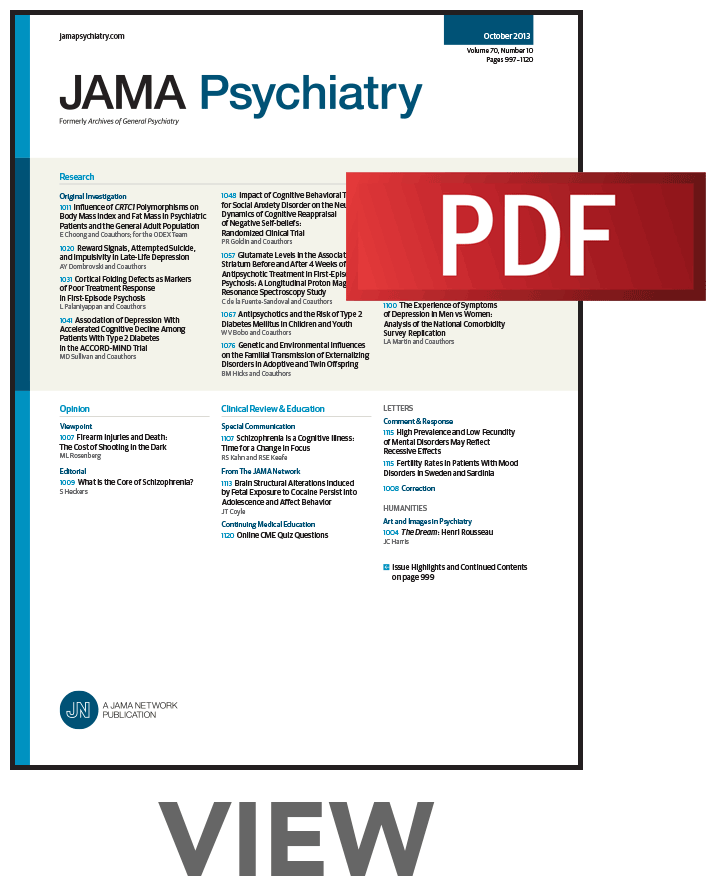美国精神病院的私募股权。
IF 17.1
1区 医学
Q1 PSYCHIATRY
引用次数: 0
摘要
医疗保健领域的私募股权(PE)所有权有所增加,但其与医疗保健质量相关的证据参差不齐。此外,没有关于精神病院住院病人的证据,尽管病人相当脆弱。目的描述2013 - 2021年精神病院PE所有权的变化趋势,以及PE所有权与医院人员配备和质量之间的横断面关系。设计、设置和参与者在本横断面研究中,利用行业资源和网络搜索构建了美国精神病院PE所有权的新数据集。对87所民营精神病院的特点与530所非民营精神病院的特点进行比较。回归模型用于估计医院人员配备和质量的调整差异。参与者包括美国所有参与医疗保险的独立精神病院(N = 617)。这些数据的分析时间为2023年9月至2024年10月。ExposurePE所有权。主要结果和方法主要结果为人员配备比、国家质量指标(约束和隔离率、7天和30天随访率、出院后用药延续率和30天全因再入院率)。其他研究的特征包括机构特征(地区、床位数量)、提供的服务、病例组合测量(服务人群、医疗保险受益人中医院平均诊断相关组得分)、入住率和平均住院时间。结果到2021年,在美国617家独立精神病院中,87家(14.10%),4660张床位(6.30%)为PE所有,其中三分之二的PE所有设施位于美国南部(63.22%)。在调整后的模型中,注册护士的PE所有权与每个病人日的员工数量显著降低相关(0.12 vs 0.15;p =。048人和医务社会工作者(0.02比0.04;p = .005)。然而,pe拥有的设施在质量指标上表现更好,包括报告的约束使用时间较低(0.03小时比0.24小时/ 1000病人小时;P < 0.001), 30天再入院(19.40% vs 20.16%;P = 0.047),高于7天(29.34% vs 26.28%;P = 0.03)和30天(52.92% vs 49.08%;P = 0.01)随访。结论与意义精神病院epe拥有量增长迅速。2021年,即使在控制了可观察到的病例混合因素后,这些设施的人员配备比例也显著降低。尽管现有措施有限,但没有证据表明pe拥有的设施质量较低。扩大美国医疗保险和医疗补助服务中心的质量措施,包括患者体验,将提供有关这些设施质量的新维度的信息。本文章由计算机程序翻译,如有差异,请以英文原文为准。
Private Equity Among US Psychiatric Hospitals.
Importance
Private equity (PE) ownership in health care has increased, but evidence for its association with health care quality is mixed. Moreover, there is no evidence regarding inpatient psychiatric hospitals, despite considerable patient vulnerabilities.
Objective
To describe trends in PE ownership of psychiatric hospitals from 2013 through 2021 and the cross-sectional association between PE ownership and hospital staffing and quality.
Design, Setting, and Participants
In this cross-sectional study, a novel dataset of PE ownership of psychiatric hospitals in the US was constructed using industry sources and web searches. Characteristics of 87 PE-owned psychiatric hospitals in 2021 were compared with 530 non-PE-owned psychiatric hospitals. Regression models were used to estimate adjusted differences in hospital staffing and quality. Participants included all Medicare-participating freestanding psychiatric hospitals in the US (N = 617). These data were analyzed from September 2023 to October 2024.
Exposure
PE ownership.
Main Outcomes and Measures
Main outcomes were staffing ratios, national quality measures (restraint and seclusion rates, 7- and 30-day follow-up rates, postdischarge medication continuation, and 30-day all-cause readmission rates). Other studied characteristics included institutional characteristics (region, number of beds), services provided, measures of case mix (populations served, hospital average Diagnosis Related Group score among Medicare beneficiaries), occupancy rates, and average length of stay.
Results
By 2021, of the 617 freestanding psychiatric hospitals in the US, 87 (14.10%), representing 4660 beds (6.30%), were PE owned, with two-thirds of PE-owned facilities in the southern US (63.22%). In adjusted models, PE ownership was associated with significantly lower staff per patient day among registered nurses (0.12 vs 0.15; P = .048 and medical social workers (0.02 vs 0.04; P = .005). Yet, PE-owned facilities performed better on quality measures, including lower reported hours of restraint use (0.03 vs 0.24 hours per 1000 patient hours; P < .001), 30-day readmissions (19.40% vs 20.16%; P = .047), and higher 7-day (29.34% vs 26.28%; P = .03) and 30-day (52.92% vs 49.08%; P = .01) follow-up visits.
Conclusions and Relevance
PE ownership of psychiatric hospitals is growing rapidly. In 2021, these facilities had significantly lower staffing ratios, even after controlling for observable case-mix factors. No evidence of lower quality among PE-owned facilities was found, although existing measures are limited. Expansions of US Centers for Medicare & Medicaid Services quality measures to include patient experiences will provide information on new dimensions of quality in these facilities.
求助全文
通过发布文献求助,成功后即可免费获取论文全文。
去求助
来源期刊

JAMA Psychiatry
PSYCHIATRY-
CiteScore
30.60
自引率
1.90%
发文量
233
期刊介绍:
JAMA Psychiatry is a global, peer-reviewed journal catering to clinicians, scholars, and research scientists in psychiatry, mental health, behavioral science, and related fields. The Archives of Neurology & Psychiatry originated in 1919, splitting into two journals in 1959: Archives of Neurology and Archives of General Psychiatry. In 2013, these evolved into JAMA Neurology and JAMA Psychiatry, respectively. JAMA Psychiatry is affiliated with the JAMA Network, a group of peer-reviewed medical and specialty publications.
 求助内容:
求助内容: 应助结果提醒方式:
应助结果提醒方式:


